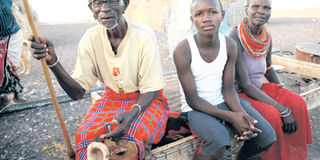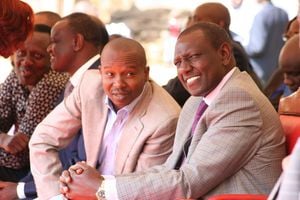El Molo lad focused on making life better for his community

Twelve-year-old Fabiano Lewa, with his father, “Captain” Charles Guya, and his mother outside their manyatta. Fabiano’s story is a grim reminder of the challenges many children in Northern Kenya face, and brings out the disparity in the allocation of resources in the country where life looks even grimmer, yet they have to make it despite the odds. PHOTO/MARTIN MUKANGU.
What you need to know:
- It was American poet and social activist Langston Hughes who once said, “Hold fast to dreams, for if dreams die, life is a broken-winged bird that cannot fly.”
- And dreaming is what Fabiano Lewa, 12, does most of the time.
- Fabiano made me promise that I would take him to Nairobi if he passed his Kenya Certificate of Primary Education (KCPE) exam.
- Fabiano’s story is a grim reminder of the challenges many children in Northern Kenya face, and brings out the disparity in the allocation of resources in the country where life looks even grimmer, yet they have to make it despite the odds.
It was American poet and social activist Langston Hughes who once said, “Hold fast to dreams, for if dreams die, life is a broken-winged bird that cannot fly.”
And dreaming is what Fabiano Lewa, 12, does most of the time.
He dreams that one day he will be able to explore the world outside his lakeside Elmolo village in Loiyangalani on the south-eastern shore of Lake Turkana.
Fabiano is the second last born son of “Captain” Charles Guya, the patriarch of the El Molo community.
Fabiano lives with his parents at their El Molo village, together with his three older siblings, (a brother and two sisters) and a younger brother.
As his father leads the rest of the group towards the lake for a boat ride, I pull Fabiano aside for a chat. But before we begin talking, he lets loose his little puppy, which dashes off towards the lake for a drink.
From the way its lapping up the water, it needed it.
But it is understandable because the temperature has soared to 45 degrees.
We find an old, abandoned boat by the lakes shore and sit inside.
“So, what is life here like?” I ask, to break the ice.
“Life is great down here. I come home for the weekend then go back to school on Sunday.
I attend El Molo Boarding Primary School, where I have been sponsored.
I walk several kilometres every Sunday to school, and back on Friday,” Fabiano responds in Swahili, pointing out the direction of his school.
“And how are you doing in school?
“I am performing well. I am now in Standard Eight. Last year, I managed 349 marks and I am sure I will excel in my final exams this year.
I want to pass and go to the university to study medicine.
I want to come back here and help my relatives.
As you can see, we depend on the only clinic in town (Loiyangalani), which is about six kilometres away,” he explains.
Fabiano says his best subject is science, because he finds it fascinating him, while maths provides the greatest challenge.
“I like science because it makes me curious about life.
We are taught about things that I can only dream of.
I have lived by this lake all my life and I would like to see the things I read about in books,” he explains.
“So, how was your journey from Nairobi?” he suddenly asks, staring at my phone.
Gruelling journey
I take my time explaining the gruelling 600 kilometres I had to cover to meet him at his rural home.
I tell him how smooth the ride was till Laisamis, after which I had to endure a torturous 275-kilometre rough road that cuts through South Horr to Loiyangalani.
From the way he’s looking at me, he doesn’t seem to understand me.
“How come you’re saying it was tough when I see the people in the lorries and Land Cruisers smiling when they pass by?” he asks, obviously puzzled by my explanation.
I mull over the question, trying to find a simple way to answer it.
But before I can answer, he decides to tell me of a trip he made last year.
It is clear from his excitement that it was a rare treat whose effects will last a long time.
“I rode in a vehicle for the first time in December last year.
I loved it,” he says, beaming, and goes on to explain that his maiden journey took him to North Horr, where he had accompanied his father on a peace meeting.
“How was it?” I ask him.
“It was fun. I really enjoyed it.
It was on a lorry and I got a chance to stand on the upper deck since the lower deck was carrying animals and goods being transported to Nairobi.
It was interesting feeling it move.
I wished it were a Land Cruiser because then I would have had a chance to sit.
Before that, I had only seen the vehicles that bring tourists to our village and the lorries that bring goods to town.
I had touched them and taken a peek inside, but I had never ridden in one,” he explains.
“So that’s the farthest you have gone outside your village?”
“Yes. Apart from going to school, that is the farthest I have gone outside Loiyangalani.
I am told Marsabit is a very beautiful town. I would really like to see it. I hear it has many cars.
I am also told Nairobi is very beautiful. I saw it on the television in school during the Westgate siege.
It looked like the towns I saw in a Jet Li (a Chinese actor) movie in one of the movie kiosks at our shopping centre,” he says.
It is hard to believe that the farthest Fabiano has been is North Horr, a dusty town on the edge of the Chalbi Desert, and that apart from the lorries that transport goods and livestock and the Toyota Land Cruisers that those working in the area use thanks to their ability to tackle the rough terrain, he has not seen any other vehicle.
‘I would like to go to Nairobi and see the tall buildings for myself.
I noticed that the roads are different from ours here. There are also very many cars and people,” he says.
As we chat, several children join us come and join us on the bench on which we are sitting, and listen, awestruck, to the tales about Nairobi.
My revelation that I live on the fourth floor of a five-storey building leaves them open-mouthed.
They all stare at me in amazement, unable to imagine that a building can be that tall!
“How come you don’t fall? And how do you get up there?” Fabiano asks, as the other children await my explanation as to how I live in the “sky”.
I struggle to explain that such buildings have staircases and lifts — I’m not sure I’m making sense to them — and that there are buildings that have more than 30 floors. From the looks that they give me, I realise that they cannot understand how that is possible.
In my mind, I wonder how these children are expected to compete with their peers doing the same primary school system when they live in a completely different world.
“What did you have for lunch?” I ask Fabiono as I share a packet biscuits I had brought along for the journey.
“Today, we had nothing. Here, we sometimes go for days without food.
That is why I love school. There, I have three meals a day and sometimes even eat foods that are not available out here.
At school I eat rice, beans and other delicacies. But our staple food is fish, so that is what we will have tonight,” he responds with a smile.
Fabiano says his favourite food so far is chapati, which he has eaten countable times in his life.
“I went to Halima’s kiosk in town and bought some chapati.
It was delicious. But I am told chips are also delicious.
I have never eaten chips and that is one food that I would like to taste,” he says.
“So what are your dreams?”
“I would like to be the first El Molo doctor so that I can uplift my community.
We depend on this lake for everything: food and water.
Whenever I come home for the weekend, I go fishing with my father.
We have been told that the water and fish make us suffer from certain diseases.
As you can see, some of my cousins here have discoloured hair and we were told it is because of the food we eat,” he explained.
Promise
Fabiano made me promise that I would take him to Nairobi if he passed his Kenya Certificate of Primary Education (KCPE) exam.
“I know I will perform well. When the results are out, I ask my cousin who has a phone to call you so that you can fulfill your promise.
I would also like to see the city that everyone in this village keeps talking big about,” he says.
As we continue chatting, now taking a stroll, while taking a walk, we pass by an El Molo girl removing dust from an elderly woman by blowing on her.
We also stop to take a photo with his parents before he disappears into the manyatta and emerges seconds later, carrying an exercise book.
“Write down your mobile number for me.
I will tell my cousin to lend me his phone so that I can call you. My older brother’s line was de-activated because he couldn’t register it,” he explains.
I scribble down the number, fold the piece of paper and hand it to him. He smiles and says we are now friends.
In the open field, Fabiano’s cousins and other small children are playing in the hot sun.
Some are wearing clothes while others are naked. They have no toys, so they make do with water bottles and soil. It’s a simple life.
As we part, “Captain” Guya says something that baffles me.
“When you go to Kenya, say hi to your people,” he whispers before I bid them farewell.
Fabiano’s story is a grim reminder of the challenges many children in Northern Kenya face, and brings out the disparity in the allocation of resources in the country where life looks even grimmer, yet they have to make it despite the odds.





